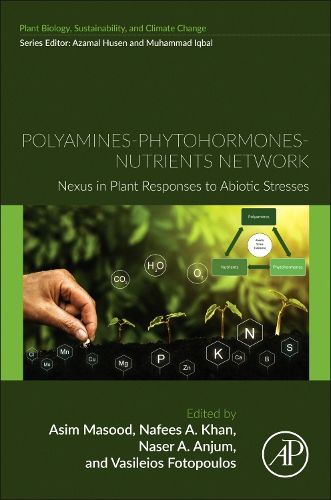Readings Newsletter
Become a Readings Member to make your shopping experience even easier.
Sign in or sign up for free!
You’re not far away from qualifying for FREE standard shipping within Australia
You’ve qualified for FREE standard shipping within Australia
The cart is loading…






Polyamine-Phytohormone-Nutrient Network: Nexus in Plant Responses to Abiotic Stresses presents the latest global research on key tools for improving physiological and biochemical mechanisms that enhance plant health and productivity.
Exposure of plants to abiotic stresses is inevitable, often leading to impaired growth, metabolism, and productivity. However, plants are naturally equipped with endogenous chemicals including intracellular messengers and signalling molecules that counteract potential stress impacts, protect cellular functions, and promote healthy growth and production. Polyamines (PAs) are low-molecular-weight, nitrogen-containing compounds with aliphatic polycationic properties. Beyond their role in growth and development, PAs enhance plant tolerance to abiotic stresses. Given their connection with phytohormones and mineral nutrients, understanding their interactions-whether synergistic or antagonistic-could shed light on their potential to mitigate these stresses.
Written by a team of expert contributors, this volume in the Plant Biology, Sustainability, and Climate Change series focuses on the interactions among PAs, phytohormones, and mineral nutrients that are crucial for regulating nutrient assimilation, carbon fixation, and secondary metabolic pathways.
$9.00 standard shipping within Australia
FREE standard shipping within Australia for orders over $100.00
Express & International shipping calculated at checkout
Stock availability can be subject to change without notice. We recommend calling the shop or contacting our online team to check availability of low stock items. Please see our Shopping Online page for more details.
Polyamine-Phytohormone-Nutrient Network: Nexus in Plant Responses to Abiotic Stresses presents the latest global research on key tools for improving physiological and biochemical mechanisms that enhance plant health and productivity.
Exposure of plants to abiotic stresses is inevitable, often leading to impaired growth, metabolism, and productivity. However, plants are naturally equipped with endogenous chemicals including intracellular messengers and signalling molecules that counteract potential stress impacts, protect cellular functions, and promote healthy growth and production. Polyamines (PAs) are low-molecular-weight, nitrogen-containing compounds with aliphatic polycationic properties. Beyond their role in growth and development, PAs enhance plant tolerance to abiotic stresses. Given their connection with phytohormones and mineral nutrients, understanding their interactions-whether synergistic or antagonistic-could shed light on their potential to mitigate these stresses.
Written by a team of expert contributors, this volume in the Plant Biology, Sustainability, and Climate Change series focuses on the interactions among PAs, phytohormones, and mineral nutrients that are crucial for regulating nutrient assimilation, carbon fixation, and secondary metabolic pathways.